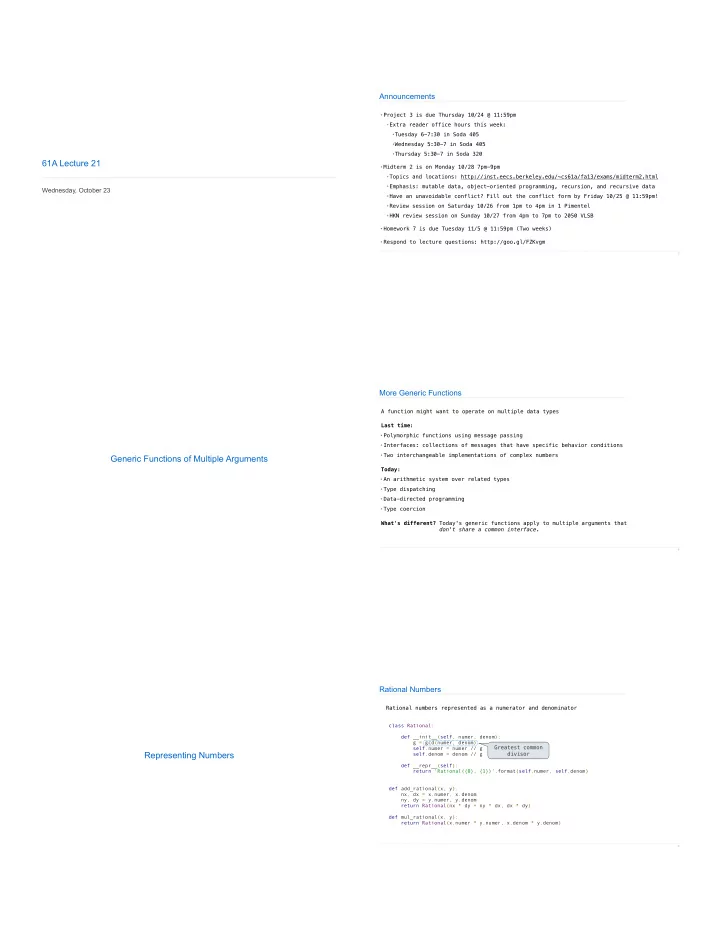

Announcements • Project 3 is due Thursday 10/24 @ 11:59pm Extra reader office hours this week: • Tuesday 6-7:30 in Soda 405 • Wednesday 5:30-7 in Soda 405 • Thursday 5:30-7 in Soda 320 61A Lecture 21 • Midterm 2 is on Monday 10/28 7pm-9pm Topics and locations: http://inst.eecs.berkeley.edu/~cs61a/fa13/exams/midterm2.html Emphasis: mutable data, object-oriented programming, recursion, and recursive data Wednesday, October 23 Have an unavoidable conflict? Fill out the conflict form by Friday 10/25 @ 11:59pm! Review session on Saturday 10/26 from 1pm to 4pm in 1 Pimentel HKN review session on Sunday 10/27 from 4pm to 7pm to 2050 VLSB • Homework 7 is due Tuesday 11/5 @ 11:59pm (Two weeks) • Respond to lecture questions: http://goo.gl/FZKvgm 2 More Generic Functions A function might want to operate on multiple data types Last time: • Polymorphic functions using message passing • Interfaces: collections of messages that have specific behavior conditions • Two interchangeable implementations of complex numbers Generic Functions of Multiple Arguments Today: • An arithmetic system over related types • Type dispatching • Data-directed programming • Type coercion What's different? Today's generic functions apply to multiple arguments that don't share a common interface . 4 Rational Numbers Rational numbers represented as a numerator and denominator class Rational: def __init__(self, numer, denom): g = gcd(numer, denom) Greatest common self.numer = numer // g Representing Numbers self.denom = denom // g divisor def __repr__(self): return 'Rational({0}, {1})'.format(self.numer, self.denom) def add_rational(x, y): nx, dx = x.numer, x.denom ny, dy = y.numer, y.denom return Rational(nx * dy + ny * dx, dx * dy) def mul_rational(x, y): return Rational(x.numer * y.numer, x.denom * y.denom) 6
Complex Numbers: the Rectangular Representation class ComplexRI: def __init__(self, real, imag): self.real = real self.imag = imag @property def magnitude(self): return (self.real ** 2 + self.imag ** 2) ** 0.5 Special Methods for Arithmetic @property def angle(self): return atan2(self.imag, self.real) def __repr__(self): return 'ComplexRI({0}, {1})'.format(self.real, self.imag) Might be either ComplexMA or ComplexRI instances def add_complex(z1, z2): return ComplexRI(z1.real + z2.real, z1.imag + z2.imag) 7 Special Methods Adding instances of user-defined classes with __add__ . class Rational: ... def __add__(self, other): return add_rational(self, other) Type Dispatching >>> Rational(1, 3) + Rational(1, 6) Rational(1, 2) We can also __add__ complex numbers, even with multiple representations. (Demo) http://getpython3.com/diveintopython3/special-method-names.html http://docs.python.org/py3k/reference/datamodel.html#special-method-names 9 The Independence of Data Types Type Dispatching Define a different function for each possible combination of types for which an Data abstraction and class definitions keep types separate operation (e.g., addition) is valid. Some operations need to cross type boundaries def complex(z): return type(z) in (ComplexRI, ComplexMA) def rational(z): How do we add a complex number and a rational Converted to a return type(z) is Rational number together? real number (float) def add_complex_and_rational(z, r): return ComplexRI(z.real + r.numer/r.denom, z.imag) def add_by_type_dispatching(z1, z2): add_complex mul_complex """Add z1 and z2, which may be complex or rational.""" add_rational mul_rational if complex(z1) and complex(z2): return add_complex(z1, z2) Complex numbers as Rational numbers as elif complex(z1) and rational(z2): two-dimensional vectors return add_complex_and_rational(z1, z2) numerators & denominators elif rational(z1) and complex(z2): return add_complex_and_rational(z2, z1) else: There are many different techniques for doing this! add_rational(z1, z2) 11 12
Tag-Based Type Dispatching Idea : Use a dictionary to dispatch on pairs of types. def type_tag(x): return type_tags[type(x)] Declares that ComplexRI type_tags = {ComplexRI: 'com', and ComplexMA should be Type Dispatching Analysis ComplexMA: 'com', treated the same Rational: 'rat'} def add(z1, z2): types = (type_tag(z1), type_tag(z2)) return add_implementations[types](z1, z2) (Demo) 13 Type Dispatching Analysis Type Dispatching Analysis Minimal violation of abstraction barriers: we define cross-type functions as necessary. Minimal violation of abstraction barriers: we define cross-type functions as necessary. Extensible: Any new numeric type can "install" itself into the existing system by adding Extensible: Any new numeric type can "install" itself into the existing system by adding new entries to various dictionaries new entries to various dictionaries def add(z1, z2): types = (type_tag(z1), type_tag(z2)) Arg 1 Arg 2 Add Multiply return add_implementations[types](z1, z2) Complex Complex Rational Rational Question 1: How many cross-type implementations are required for m types and n operations? Complex Rational m · ( m − 1) · n Rational Complex Respond: http://goo.gl/FZKvgm 15 16 Data-Directed Programming There's nothing addition-specific about add. Idea : One function for all (operator, types) pairs def apply(operator_name, x, y): tags = (type_tag(x), type_tag(y)) Data-Directed Programming key = (operator_name, tags) return apply_implementations[key](x, y) (Demo) 18
Coercion Idea : Some types can be converted into other types Takes advantage of structure in the type system def rational_to_complex(x): return ComplexRI(x.numer/x.denom, 0) Type Coercion coercions = {('rat', 'com'): rational_to_complex} Question: Can any numeric type be coerced into any other? Respond: http://goo.gl/FZKvgm Question: Have we been repeating ourselves with data-directed programming? 20 Applying Operators with Coercion Coercion Analysis 1.Attempt to coerce arguments into values of the same type Minimal violation of abstraction barriers: we define cross-type coercion as necessary. 2.Apply type-specific (not cross-type) operations Requires that all types can be coerced into a common type. def coerce_apply(operator_name, x, y): More sharing: All operators use the same coercion scheme. tx, ty = type_tag(x), type_tag(y) if tx != ty: Arg 1 Arg 2 Add Multiply if (tx, ty) in coercions: Complex Complex tx, x = ty, coercions[(tx, ty)](x) Rational Rational elif (ty, tx) in coercions: Complex Rational ty, y = tx, coercions[(ty, tx)](y) Rational Complex else: return 'No coercion possible.' From To Coerce Type Add Multiply assert tx == ty Complex Rational Complex key = (operator_name, tx) Rational Complex Rational return coerce_apply_implementations[key](x, y) (Demo) 21 22
Recommend
More recommend